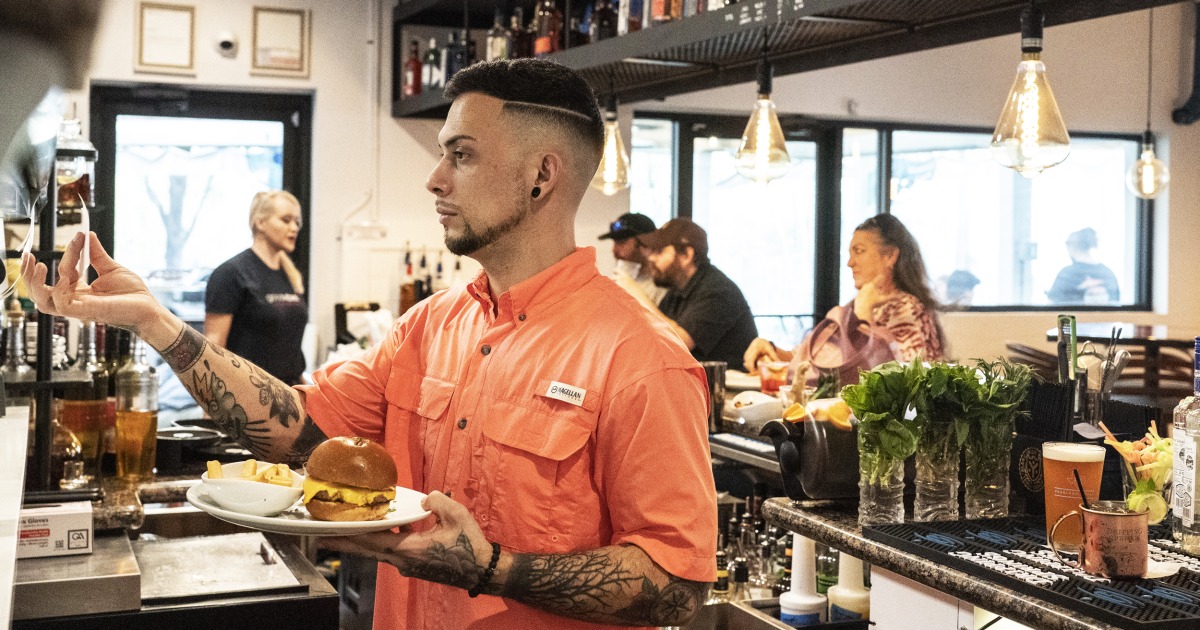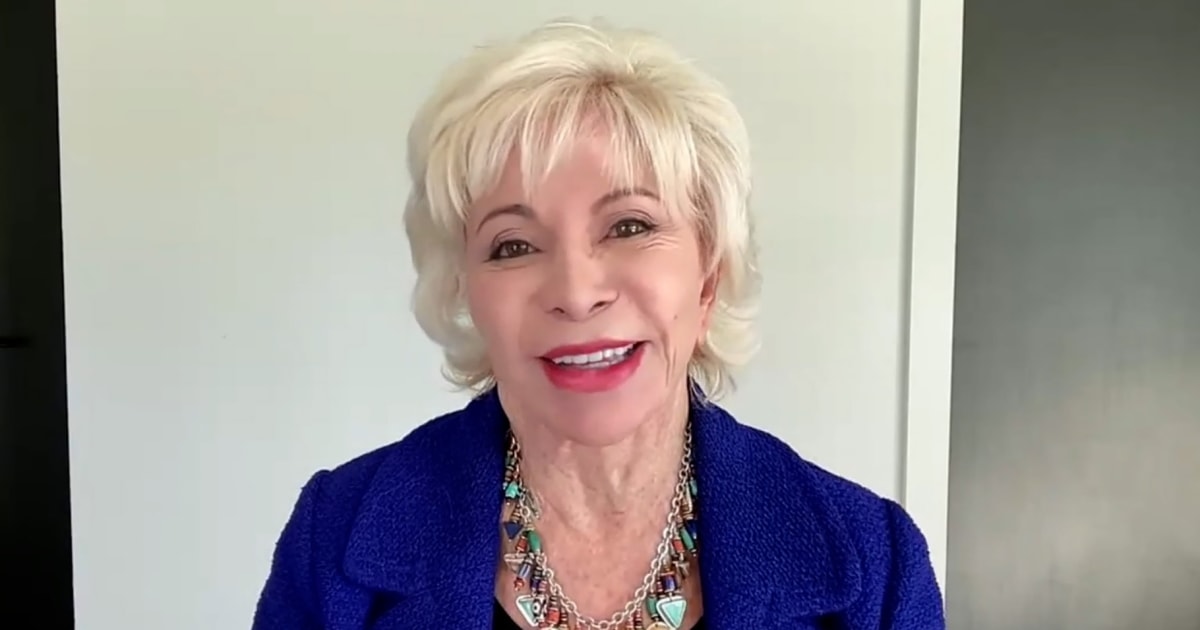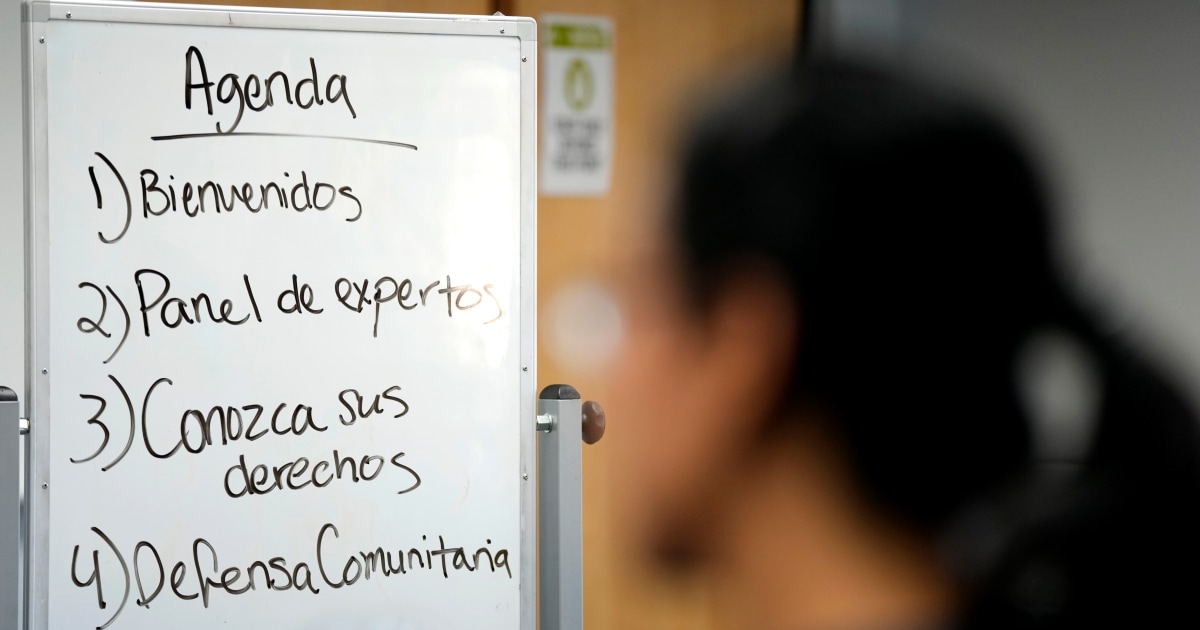The day Ana María Carrillo couldn't get the milk formula she needed to drink Lorenzo, her eight-month-old baby, in an undersupplied Maracaibo, she knew that the end of a stage was near.
The alarm had sounded loudly. His family was in danger. I had to find an urgent way out.
With her husband Roberto Cánua they began to consider possibilities and made a drastic decision: they would leave Venezuela to emigrate to Argentina.
Roberto, a consultant and data analyst, was the first to assemble suitcases. Ana, a solid architect, followed him months later with Lorenzo.
Leaving jobs of years and, above all, to large parents in a "chaotic" country, recalls Ana, caused them emotional damage that still hurts, but they were on the ropes.
2018 found them already settled in Vicente López. "We had the sense of danger embedded in our souls. When we arrived in Buenos Aires we immediately felt safe. It's the same thing that happens to us now, me with 49 years, my husband with 61, Lorenzo with 7 and Laura, with 14, daughter of a previous marriage of Roberto, "defines Ana.
"The country has very powerful problems such as the economy, which reminds us in part of what we went through in Venezuela, but there are also many positive aspects. We live in peace," he says.
The ropes that circumstances put in front of the Cánua Carrillo family looked quite like the abyss. They jumped and were saved, like thousands of other immigrants who, faced with terminal crises or wars in their territories, took refuge in the country in recent years.
The vital horizon is vast: there are also cases of people from different cultures and continents who arrived moved by other powerful forces such as love, the desire to find their place in the world, a work project or, simply and magically, destiny.
Why are they staying? How do the economic, political and social ups and downs that are already part of the Argentine gene impact them? Are they where they want to be or do they think it was a mistake to emigrate? What do they see when they see us?
Love as an engine
Adventurous and rebellious by nature, Colombian Dayana Bermúdez (33) -actress, model, social communicator and influencer- was on vacation in Bogotá when she was invited to an avant premiere that would mark her forever.
There, in the midst of hundreds of people, was the man for whom he later took unthinkable risks.
Dayana Bermudez. He arrived from Colombia in 2016. Photo: Esteban Leyba.
The impact was straight to the heart. It was August 2016. Four months after that spell, she moved to Buenos Aires with "el argentino", a low-profile film director and producer.
"The decision was simple and quick. I packed up and took the plane to Argentina. I come from a migrant family: it didn't cost me to uproot myself. At that time, I was living in Germany, I was 26 years old and I was looking at which country to disembark in. When I met my partner, I had no doubts," Dayana tells Viva.
Seven years after that move and living with the man who changed her plans, the Colombian says she was not wrong.
From the first day, the doors were opened to him helped by his devastating energy. Today he defends the country as if it were his own. He made it very clear in a video that he uploaded to his tik tok @bermudezcortes account.
In terms of diversity, equal rights and gender, Argentina is an advanced country, superior to others in Latin America.
Dayana Bermudez, Colombian.
There he looks at the camera and "intimate" the Argentines to open their eyes and see the Albiceleste potential compared to other countries.
Focus on Spain: Can anyone explain to me why you want to go to Spain? Don't they realize how rich this country is?" he emphasizes.
The video, with more than 4 million views, represents his thinking raw.
"I travel a lot and Argentina is advanced: the cultural richness is infinite. In terms of gender, diversity and equal rights, it is superior to any country in Latin America. They give visibility to the struggles," he says.
Paradoxically, he affirms that, as an Afro-descendant, he lived situations of racism and discrimination in places where he moved and trained.
"It was very painful, but I was able to get through those obstacles. Today I occupy spaces that those who discriminated against me said I would never occupy," he shoots.
In political terms, it highlights the possibility that all sectors can express themselves freely, something that, he compares, does not happen in Colombia.
"I would never recommend someone to move to Argentina to earn money. The economic is complicated but in the balance there are more points in favor, "he highlights.
Among the contrasts, Dayana admires "Argentina's ability to reinvent itself, to continue in spite of everything", although, on the other hand, she describes: "They are very complaining. They live very stressed, always at high speed."
He also confirms that his "Argentine experience" is totally positive. "I feel like I grew up here as a woman, as a person. I returned to acting, one of my great passions. I never lacked work, especially in advertising. I'm very grateful," she adds.
As a sign of love for what he has lived and the present, he thinks about the future: "My dream is to have an Argentine son," he enthuses.
Getting stranded as a starting point
Dance. Dance to convey African culture and joy. Dancing to improve the lives of others. Dance to feel alive and chase away the pain.
With that philosophy, the Senegalese Idrissa Diop (33) had managed to make a place in his native Dakar. There he had set up the dance company "Renaissance" (Renaissance in French) with which he participated in events and gave classes. Until an offer came to him that he could not refuse. A producer proposed him to travel the world with the project "Sounds of Africa".
Idrissa Diop and her Argentine son, Gael Birima, 3. Photo: Esteban Leyba.
His team would join other dance corps. Accepted. It would surely be an enriching experience for your mind and soul.
Argentina was among the first stops. With a work visa and a lot of enthusiasm, he arrived in the country in 2019. At first everything flowed. He danced at the CCK, Tecnópolis, at the National Library, hotels and stadium shows accompanying artists.
One day the producer commented that they would travel to Europe and that's when the problems began: Idrissa's passport was not authorized to travel. Thus, from one day to the next, they left him stranded in Buenos Aires.
"I felt like my world was falling," recalls the Senegalese from that hostile time. Alone and in an unknown country, he was forced to start from scratch when the idea was different.
He relied on his spiritual guide, Serigne Touba, leader of the Muslim Muridist movement, and the huge Senegalese community that immediately contained him. The musician and activist for the rights of people of African descent, Emanuel Ntaka (former Mambrú), helped him return to the arena with his art.
Now everything is expensive, I'm feeling it. Still, I trust that this will change. We must keep pulling forward.
Idrissa Diop, Senegalese.
The Sabar dance, a typical Senegalese dance accompanied by the rhythm of drums, was his lifeline. She began dancing in squares and parks and later opened up to cultural centers and festivals.
In that artistic round, he met Celeste (33), his Argentine wife and mother of his three-year-old son Gael Birima and a girl on the way. She is a dancer and singer. Between the two of them they rowed it and the machine restarted. The uncertainty was left behind.
In the neighborhood of Belgrano, where they are putting down roots, Idrissa's days are busy. Dancing African rhythms brings him closer to his land and connects him with people he was incorporating into his history.
"I try not to have problems with anyone. I respect everyone for what they do. In Argentina there are good and bad aspects as anywhere, "says Idrissa.
Among the negative points, it puts the focus on the economy. "It's all expensive. Other Senegalese who came longer ago tell me that it wasn't like that before, but I'm feeling it. I am still confident that this will change. You have to push forward," he reflects.
With regard to society, it elevates kind people in front of those who speak without knowing the other.
"I don't like that. There are some Argentines who like to talk behind you. It doesn't seem genuine to me. For me it is a priority to be sincere," he stresses.
With his spiritual gaze hovering overhead, Idrissa believes his God diverted his route to our country. She feels that now her mission is to transmit Senegalese culture and, with her dance, to help those who need it. "Bailar curas", reinforces and transmits it on his instagram account @idrissa.senegal.
Like most Senegalese who came to Argentina in recent decades, he left a huge family of parents, brothers and uncles in Dakar and other neighborhoods like Louga.
He usually sends them money because it is not easy to live there either. He plans to visit them, but always with a ticket back to Buenos Aires. It has projects. You are no longer alone.
Finding your place in the world
The equation is complex. While thousands of Argentines emigrate in the face of fallen projects and broken horizons, 1,805,957 foreigners – according to the last census – are building their life after life in some neighborhood of our country.
Dutch correspondent Peter Schouten (41) chose to stay here in 2019. She is writing her own story with her Argentine husband in "his favorite neighborhood": San Telmo.
Dutch journalist Peter Schouten.
In the pages of the past he has engraved enormous challenges as a journalist. He worked for two Dutch prime ministers and was a spokesperson for an NGO dedicated to showing how children live in war.
He went from Iraq and Colombia to Congo and Lebanon. Until in 2016 he got to know Buenos Aires thanks to an internship at the Dutch embassy and everything changed. He fell in love with the country. Some time later he rethought his life, left everything and came back to stay.
Today he works as a correspondent for the Netherlands and is never short of news to communicate. Argentina is a permanent information powerhouse for the territory of Queen Maxima, but also for the rest of the world.
In a short time, he covered milestones such as the death of Maradona, the legalization of abortion and the triumph of the National Team in the World Cup.
This fascinating country deserves politicians who defend Argentines and not themselves. Argentina has enormous potential.
Peter Schouten, Dutch.
"I don't regret my decision at all," Peter shares. He transmits it in his voice. He's happy. That is why, he says, he is surprised by the love-hate relationship of Argentines with the country.
"Sometimes foreigners are happier to live here than Argentines themselves," he observes. On the same level, he admires the resilient power of society. "Things are not good at all and they always survive. They never give up," he is amazed.
With his journalistic magnifying glass, he says he sees a very worrying "protectionist" economy and with galloping inflation that cannot be maintained.
"If you want to be the center of the world, you have to open up, welcome investments. It becomes difficult to do business here," he stresses.
The "unnecessary" polarization in politics is, in his opinion, another serious national problem. "This fascinating country deserves politicians who defend Argentines and not themselves," he emphasizes with conviction.
Peter speaks and has a passion for what is ours. His gaze is full of colors. "Everything here is intense. Nothing is gray. All foreigners think about it: Argentina has enormous potential," he begins.
The enumeration of qualities follows. The Dutchman stresses that the country has the raw materials "that the world needs", "rarely seen natural landscapes" and incredible architecture, as well as a population with high education and social mentality.
In addition, he is impacted by gastronomy, the wide range of cultural activities, the vibrant day and night life "24 hours a day all week" and, above all, the unquestioning openness to sexual diversity, among other essential pillars.
"The LGBT environment is very nice and safe. Here no one is surprised when I walk hand in hand with my Argentine husband down the street. In the Netherlands we are sometimes looked at strangely. Buenos Aires is like a gay paradise in Latin America," he says from his personal experience.
Living with little agenda, more flexible activities and schedules, is another positive side that admires the country, while in the Netherlands everything is millimetrically organized and planned. "What more could you ask for? Who can explain to me why things don't go well?" asks Peter.
Complaint as a national sport
Without knowing each other, the Venezuelan Ana María Carrillo agrees with Peter, Dayana and Idrissa in the concern for the economy although with a plus: the family trauma left by the Venezuelan crisis. "We lived in a dictatorship. Everything was missing," Ana recalls sadly.
"What is happening with the economy, especially with inflation, worries us a lot because we know what can happen. We hope that this will stop. Argentina is going to move forward," he hopes.
Despite their differences, these new immigrants agree in pointing out the positive aspects of Argentina. Photo: Esteban Leyba.
While he admits that insecurity is another source of alarm, he returns to the Venezuelan pattern they left when they left.
"There is no point of comparison. Here at night you can walk. In Venezuela, it was never a total risk," he says.
Negativity is another of the coincidences with the other immigrants consulted. "The emotional often overcomes them. They are complainers. It is common to hear them say that things are very bad. If there is something positive in 90 percent and negative in 10 percent, they concentrate on the negative. They don't realize that, with its ups and downs, it's a country that works," says Ana.
What is happening with inflation worries us a lot because we know what can happen. Let's hope it stops.
Ana María Carrillo, Venezuelan.
That makes her sad, she says, because she became very fond of the country and believes that thinking negatively takes away energy.
"They are very respectful and have a great sense of humor. We never felt discriminated against or looked at us with compassion," he counters.
Today, his son Lorenzo grows up happy. He studied at school Nro. 12 Florida and is full of friends. "He's argenzolano," laughs Ana.
Her husband Roberto continues to work in data analysis. Ana teaches Spanish online through different platforms and always has students. He's doing very well. He did not return to architecture because he could not revalidate his degree.
Her network of friends are the mothers of Lorenzo's school. The first ones who hugged her when they arrived in Buenos Aires without knowing what was going to happen. Gone is the sense of danger embedded in the soul.
Submerged in their own seas, there are those who prefer to move on the shores without waves. They are the calm, those who bet to start, spend and end their days in the same space, with the least possible room for maneuver.
Their desire is to avoid risks.
Opposite are those who dive into the wild depths. Nothing and no one guarantees that they will come out afloat, unharmed, but they still try.
They rethink everything, recalculate if the scenario is not the best or the dreamed of and launch with or without a network.
The last road has sealed the steps of Peter, Dayana, Idrissa, Ana, Roberto, Lorenzo and Laura. They broke their strings. In their maps, among the 195 countries of the world, they coincided in the extreme south of America.
They have this stage of their lives painted blue and white.
See also
Creole karma: Buddhism expands in Buenos Aires
See also









